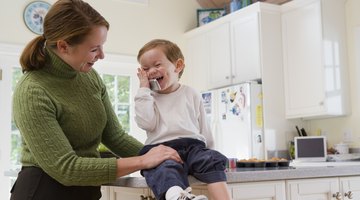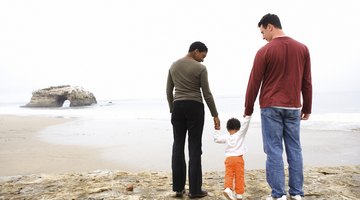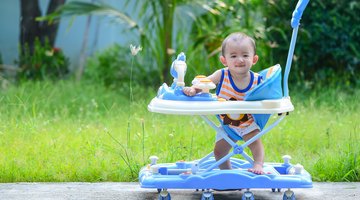When Should Babies Start Crawling, Walking & Talking?
Babies, like adults, vary considerably in their abilities. No two babies begin crawling, walking or talking at the same age, even if they're in the same family.
Each child develops at an individual pace, although most children fall into a certain range for meeting developmental milestones. If your baby falls outside the general guidelines, talk to your doctor, but don't panic; a small percentage of perfectly normal babies do things earlier or later than most.
Crawling
The age at which babies crawl varies, and so does the method they choose. Some crawl on hands and knees, while others pulls themselves in an army-style crawl across the floor. Some don't put their knees on the floor but move crab-like on hands and feet.
Some babies never crawl but choose to roll or scoot on their well-padded behinds across the floor. Babies often go backwards before they go forwards. Most start crawling between 6 and 10 months, BabyCenter.com reports.
Since most babies are spending minimal time on their stomachs, with the advent of the "Back to Sleep" program, many never crawl or start crawling later. If your baby hasn't mastered some type of mobility by 1 year, talk to your doctor.
Walking

Developmental Milestones Related to Climbing
Learn More
Most babies begin walking anywhere between 9 and 16 months of age, with 50 percent walking by 12 months, according to pediatrician William Sears. Most children "cruise" first, walking around the furniture, holding on for support, and then advance to wanting to walk holding your hands, a stage that can be very hard on parental backs. After that, your baby may want to walk holding onto just one of your fingers for balance. Early walkers may have driven personalities, while late walkers may have a more cautious outlook on life. When they do walk, they may do it more competently than their early-walking friends and take fewer spills.
Talking
Most babies crawl and walk within a fairly short time period, but talking can really run the gamut.
A baby of 12 months typically says one or two words, although only her parents may recognize them.
By 18 months, the average baby says between five and 20 words.
Between ages 1 and 2, most can put together a two-word sentence, and between 3 and 4, many know and use around 1,000 words. Concerning signs that warrant a talk with your doctor include not using gestures, such as waving bye-bye, by 12 months, not imitating sounds by 18 months and not saying words or phrases spontaneously at 2 years. An unusual tone of voice, such as raspiness or speech that's difficult to understand, also warrants evaluation. You should understand about 50 percent of what your child says by age 2 and 75 percent by age 3, KidsHealth.org states.
Caveats

Excessive Talking in Children
Learn More
Parents can go to two extremes when their child falls outside the norm: panic and complacency.
Since many perfectly normal children don't fit within the time frames, don't assume something is wrong if your child doesn't fall in the "normal" range. But do have your child evaluated, since early intervention can help if he truly has developmental delays.
Related Articles
- BabyCenter: Developmental Milestones, Crawling
- AskDrSears.com: When Babies Usually Walk
- KidsHealth; Delayed Speech or Language Development; October 2010
- University of Michigan Health System; Developmental Delay; Kyla Boyse, R.N.; February 2010
- University of Michigan Health System; Speech and Language Delay and Disorder; Kyla Boyse, R.N.; June 2008











